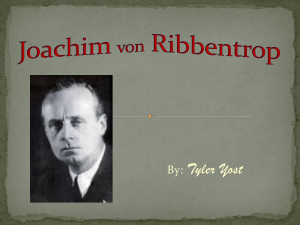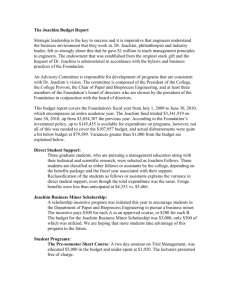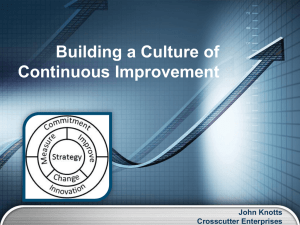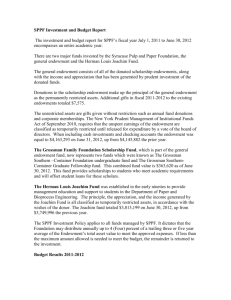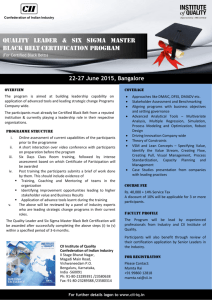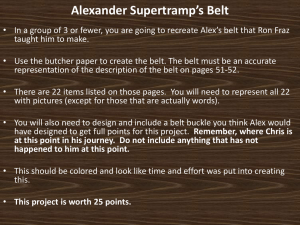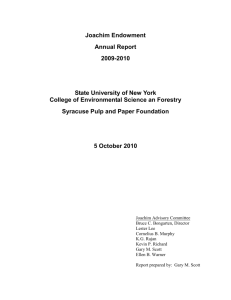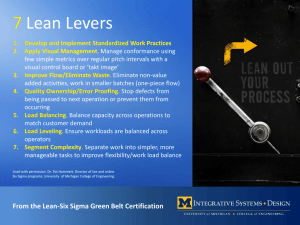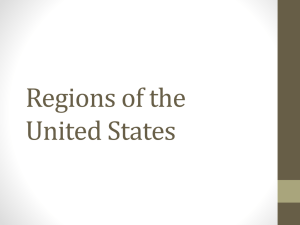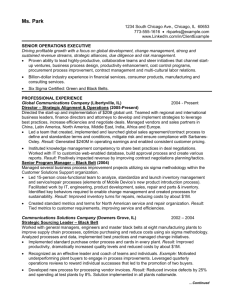Joachim Endowment Report - SUNY College of Environmental
advertisement
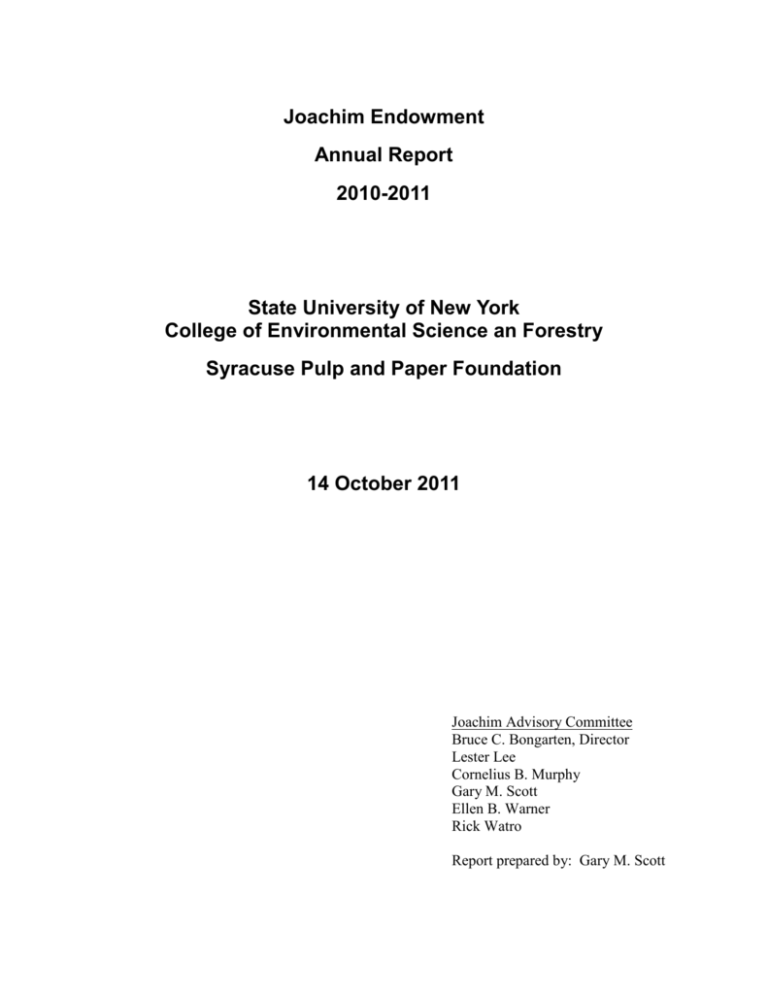
Joachim Endowment Annual Report 2010-2011 State University of New York College of Environmental Science an Forestry Syracuse Pulp and Paper Foundation 14 October 2011 Joachim Advisory Committee Bruce C. Bongarten, Director Lester Lee Cornelius B. Murphy Gary M. Scott Ellen B. Warner Rick Watro Report prepared by: Gary M. Scott Joachim Activities The Herman Louis Joachim Endowment was established in the early nineties to provide management education and support for students in the department of Paper and Bioprocess Engineering. Dr. Joachim recognized the need to teach management basics to young engineers, and created the Endowment to assure that PBE graduates are capable managers. The endowment, currently valued at about $4 million, provides a funding base for student activities and scholarships related to management training. Over the past year, the key activities supported by the Joachim Endowment are described below. Tappi Student Summit: A number of undergraduate students were able to attend the TAPPI student summit in Kingsport, Tennessee in January. At the summit, students were able to interact with industry leaders and obtain information on employment opportunities and the state of the industry. Topics covered during the summit included: • “Effective Networking • The Annual Engineering Challenge • Job recruitment interviews with hiring companies • Job transition and getting the right job • Domtar mill tour The students found this to be an invaluable experience in developing their professional skills and networking with other students and members of industry. We expect support for this activity to continue into the future. Joachim Fellow Support: The Joachim Endowment was used to sponsor two fellowships for graduate students in PBE. The 2009-10 Fellows were Beth Arthur and Prajakta Dongre. The Joachim Fellows engaged in a number of activities during the course of the year including providing seminars to students in the department as well as engaging in outside training. The Joachim fellows were instrumental in developing and implementing the Six Sigma training program and the development of the professional engineering skills courses described more completely below. In the upcoming year, the three Joachim Fellows will be instrumental in implementing the programs supported by the Joachim Endowment. Six Sigma Training: Twenty-four undergraduate and graduate students received their Six Sigma Green Belt after attending several seminars and working on a semester-long project that illustrated the principles of Six Sigma. Six Sigma is a management method that improves processes by identifying and removing the causes of defects and process variability. Many of the undergraduate students applied the techniques in conjunction with their senior product/process design class, PSE 468 (Papermaking Processes). In the course, they learned how to work through a defined series of steps that also had a basis in the statistical analysis of the resulting data. Green Belt certification is the first step in the complete Six Sigma certification process and many employers require their process engineers to get this training soon after starting work. By providing the training to the students at the university, they enter the workforce one more step ahead of their peers from other universities. The next step in the certification process is the Black Belt. Based on the success of the program this year, we are planning on holding a Black Belt training session in conjunction with another Green Belt session in the upcoming academic year. Educational Program Development: Beginning in Fall 2011, the PBE Department will offer the course GNE 330 (Professional Engineering Skills) to all students. GNE 330 will be taught in a seminar format including seminars and workshops given by faculty, students, and guest speakers. The topics covered will vary from year-to-year, but will generally repeat over a three-year cycle. In this way, all students will encounter most of the topics during their undergraduate education starting with the sophomore year. Students starting in Fall 2011 and after will be required to take the seminar each semester from their sophomore to senior years. The Engineering Accreditation Commission of ABET (EAC/ABET) specifies in Criterion 3 that engineering programs must have documented student outcomes that prepare graduates to attain the program educational objectives specified by the particular program. The design of engineering courses typically focus on the technical skills primarily and the professional skills secondarily. The purpose of this seminar course is to enhance the instruction of the professional skills in areas such as teamwork, ethics, communication, management, professional development, and contemporary society. Joachim Fellow Report 2010-2011 Beth Ann Arthur Academically, I completed my required coursework to meet the academic criteria of the doctoral program. I will continue with my research credits only to prepare for my defense next spring. Professionally it was a very busy year. The inaugural session of the Green Belt certification class was developed through the summer and fall 2010 with the first session offered spring 2011. The class was co-developed with Master Black Belt, Bradford Arthur in conjunction with Sigma Quest who authenticated the students and SUNY-ESF Green Belt certification. The course was developed for the students to work in teams, similar to what they will experience in industry with a project to “lead”. The course was certified the first pass and will be offered again in the spring 2012. Concurrently, plans for extending the Green Belt offering started the beginning developments of the Black Belt program. The program design would be in the same light as the Green Belt program with project teams working with hands-on teaching in the computer labs combined with the lecture. The Professional Engineering Skills Seminar was also established in the SUNY-ESF course catalog with a 0.5 credit class being offered in the fall of 2011. The three year rotating schedule was developed including the criteria to meet the desired (a-k) ABET soft skills. The first seminar series will be entitled Teambuilding and was designed to have interactive classes as well as round table seminar sessions to engage the students and get them comfortable with the people skills. In closing, I would like thank the Joachim Board for another fulfilling and rewarding year. I feel that I was instrumental in helping develop fundamental courses needed to maintain the ABET accreditation while learning at the same time. I am honored to work with Dr. Scott in developing these courses and cherish his mentoring and support. I look forward to my final year as a Joachim Fellow in cementing the new Professional Skill Seminar Series in the PBE curriculum and leaving a program start which can be the building blocks for future Joachim Fellows to expand. Joachim Fellow Report 2010-2011 Prajakta Dongre I received the award in spring 2011 and over the course of the semester and the summer I had been involved in the process of developing the Professional Engineering Skills course for fall 2011. The course addresses several crucial aspects of team work which are often neglected but can make a team more efficient if they were better understood by team members. I took a course on Management in the Paper Industry in the spring semester offered in the PBE department. The course helped me with an understanding of the management aspects of this industry, the constraints within which it operates, and the potential it holds for its products. The course dealt with strategies to become a good manager and scenarios from both a manager’s and the employee’s points of view were explored. The class was conducted in the form of a discussion, which gave everyone an opportunity to share opinions and experiences. I was also undertaking the Six Sigma Green Belt training under the Joachim endowment and have received the green belt for Six Sigma. The process of Six Sigma is that of using statistical and non statistical methods to improve the performance of a company. This is an important tool which can break down every process of production, make it more efficient and also contribute towards saving funds. The project that my team and I undertook was to examine and try to improve the process of converting barley mash to sugar to obtain maximum yield. We did the Process map, Failure Mode and Effect Analysis (FMEA) and the Design on Experiment (DOE) on the process. All these tools helped us to identify the sub process that needed most attention and could be improved. The process of Six Sigma is not only applicable in an industry setting but can also be applied to research to make it more efficient. The Professional Engineering Skills has taken off and I am the teaching assistant for the course this semester. The course this semester deals with team building and is an interactive course. Being a teaching assistant for this course is gearing me up for the following semesters when I will be teaching the course. I am gathering material for the topics that will be covered for the spring 2012 and fall 2012 which will be Engineering Ethics and Communications respectively. This involves putting together teaching material for the course, planning the student assessment policy and preparing a syllabus. The Six Sigma Green Belt training will take place again in spring 2012. As a Green Belt myself, I hope to contribute to the teaching sessions next semester. I am currently involved in the process of providing feedback for the last session and preparing to improve and modify training sessions to fit the participants which will also include professionals. I am taking two marketing courses this semester at the Whitman School of Management in Syracuse University – Creating Customer Value and Managing the Marketing Mix taught by Professor Ernest Lathrop. The courses address marketing research, planning and strategies that are required to market a certain product. The class looks at various case studies of different corporations and companies which are then discussed in class. A term project for class also requires us to act as consultants for Nice n Easy Grocery Stores and provide them with marketing strategies to improve their business. This is a great opportunity to gain hands-on experience of marketing as it familiarizes us with real life situations and circumstances. One of the future plans is to promote the MPS program of the PBE department for students in other majors at ESF. The MPS program would be an addition to their qualifications that could put them at par with Paper and Bioprocess engineering students. I intend to apply the knowledge gained in these two classes to promoting the MPS program to the target market. Another task that I hope to accomplish by the end of this academic year is to contact potential companies which are in the bioprocessing field and are prospective employers for the bioprocessing engineers of our department for internships and full time employment. I have taken pride in being a Joachim scholar which has presented me with several opportunities to develop myself in different areas of research and management. I believe that by the end of this academic year, I will have developed several tangible deliverables with the help of the award.
